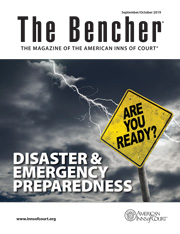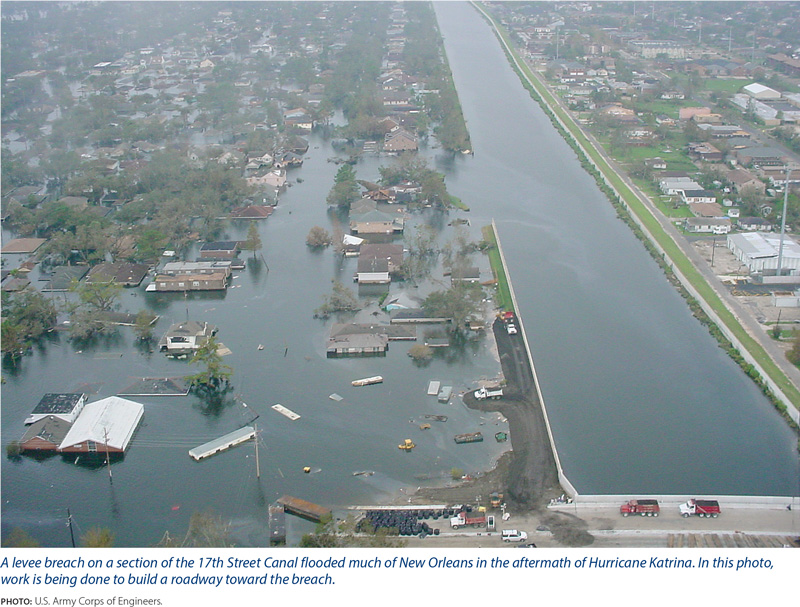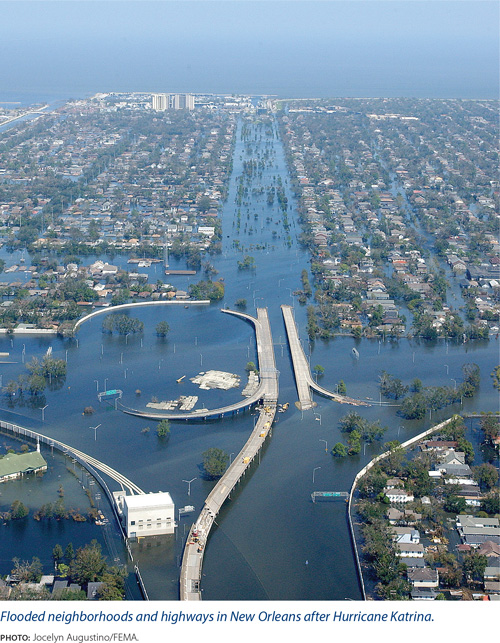Lessons Learned from Hurricane Katrina
The Bencher—September/October 2019
By Judge Ivan L.R. Lemelle and James M. Garner, Esquire
 We both live in New Orleans, which, as you know, was severely damaged when Hurricane Katrina struck the area on August 29, 2005. In advance of Katrina’s landfall, most residents of New Orleans evacuated the city. Because of the hurricane and the resulting levee breaches, huge swaths of the city were inundated with flood waters. Katrina resulted in many of the area courts being closed for days or even months and many legal offices being closed or relocated due to office damage and/or damage to the city’s infrastructure. Along with hundreds of thousands of citizens and tens of thousands of businesses, the affected area—state and federal courts, lawyers, and their respective staffers—sustained severe damages. Homes were uninhabitable for weeks or months.
We both live in New Orleans, which, as you know, was severely damaged when Hurricane Katrina struck the area on August 29, 2005. In advance of Katrina’s landfall, most residents of New Orleans evacuated the city. Because of the hurricane and the resulting levee breaches, huge swaths of the city were inundated with flood waters. Katrina resulted in many of the area courts being closed for days or even months and many legal offices being closed or relocated due to office damage and/or damage to the city’s infrastructure. Along with hundreds of thousands of citizens and tens of thousands of businesses, the affected area—state and federal courts, lawyers, and their respective staffers—sustained severe damages. Homes were uninhabitable for weeks or months.

The U.S. District Court for the Eastern District of Louisiana (EDLA) was briefly closed in the immediate aftermath of the storm but was largely undamaged. Due to the condition of the city, the court operated from temporary locations for a period. It officially returned to New Orleans on November 1, 2005, but continued to operate from temporary locations within the Fifth Circuit and beyond until January 1, 2006. Thanks to rapid responses from the Administrative Office of the U.S. Courts and various courts within the federal Fifth Circuit, vital personal and professional support services were made available to sustain all affected EDLA personnel. Various judges of the state’s Orleans Parish Criminal District Court and Civil District Court used available courtrooms and chambers in EDLA’s Hale Boggs Courthouse on a temporary basis. The Louisiana Supreme Court building, which was located in the historic French Quarter in New Orleans, was closed until December 5, 2005. The court accepted only emergency filings at its temporary facilities in Baton Rouge, Louisiana, until the reopening. Numerous court orders and gubernatorial decrees were entered to suspend various deadlines and the running of time limitations for filing suits. Additionally, the Louisiana Legislature enacted laws suspending the running of time limitations and extending the timeframe for filing of insurance claims. The Louisiana Supreme Court ultimately upheld the statutory extension of time for filing insurance claims even if it violated the precise terms of the insurance policies at issue. State v. All Prop. & Cas. Ins. Carriers Authorized & Licensed To Do Bus. In State, 2006–2030, p. 1 (La. Aug. 25, 2006), 937 So. 2d 313, 316.
 Like many law firms, the Sher Garner law firm relocated to temporary offices in Baton Rouge for several months because of damages sustained to its building. The initial response of the legal community to the storm’s impact was damage control: determining how to access computer systems and data and setting up temporary operations as rapidly as possible. For Sher Garner, this meant not only renting temporary office space, but locating temporary living accommodations for employees. Additionally, everything necessary to run a legal office, from computer equipment to furniture, had to be obtained quickly. After the waters receded, the city of New Orleans allowed access to offices on a “look and leave” basis, and Sher Garner was able to retrieve important items from our offices, such as computer servers—which were lugged down 28 floors of dark stairs by a task force that included spouses of Sher Garner attorneys. This “look and leave” task was done across the city, including physical movement of the court’s computer servers by its information technology staff.
Like many law firms, the Sher Garner law firm relocated to temporary offices in Baton Rouge for several months because of damages sustained to its building. The initial response of the legal community to the storm’s impact was damage control: determining how to access computer systems and data and setting up temporary operations as rapidly as possible. For Sher Garner, this meant not only renting temporary office space, but locating temporary living accommodations for employees. Additionally, everything necessary to run a legal office, from computer equipment to furniture, had to be obtained quickly. After the waters receded, the city of New Orleans allowed access to offices on a “look and leave” basis, and Sher Garner was able to retrieve important items from our offices, such as computer servers—which were lugged down 28 floors of dark stairs by a task force that included spouses of Sher Garner attorneys. This “look and leave” task was done across the city, including physical movement of the court’s computer servers by its information technology staff.
After the storm, the court systems were inundated with hurricane-related claims, including insurance claims related to the disaster and claims against the U.S. Army Corps of Engineers and others related to the levee breaches. Sher Garner not only had its own business interruption and property damage insurance claims, but most of its employees had property insurance claims related to their homes and automobiles also. Additionally, the firm helped many of our clients, including local institutions such as universities, banks, and hospitals, with their own business interruption and property damage insurance claims, Federal Emergency Management Agency claims, and claims against the U.S. Army Corps of Engineers. Many of those matters ended up in litigation and helped clarify legal issues regarding first-party property insurance claims, business interruption claims, and bad faith claims against insurers.
There were several law practice-related lessons learned from Katrina. Most importantly, all businesses must have a plan for disasters. Past storms had generally resulted in short evacuations of a day or two. Sher Garner realized it was important to have a plan for being unable to access our offices for a long period of time. That includes having a means to back up and access computer data and systems remotely and having a way to communicate with employees when cellular and internet services are severely impaired. The firm also set up an employee portal on our website with the ability to switch over to a remote server location if a storm approaches. It is also important to have access to necessary documents such as insurance policies. While most courts pre-Katrina had continuity of operations plans (COOP), major improvements were made to plans, such as the creation of occupant emergency plans (OEP), investing in off-site backup computer servers, mapping out pre-assigned housing and work sites for future evacuations, improving communication avenues, and conducting periodic assessments and training to implement OEP/COOP procedures.
The most important ethical implication for attorneys dealing with the impact of a disaster is to ensure that clients’ rights are not adversely affected by the disaster’s impact on their law practices. After Katrina, the courts and government attempted to mitigate the potential for attorneys missing filing deadlines by entering orders and enacting legislation extending deadlines. The ultimate validity of those extensions was not resolved for months. As such, prudent litigators struggled to be sure to file suits in order to avoid a finding that an action was time-barred. Additionally, New Orleans attorneys with cases in other, non-impacted jurisdictions were forced to either meet filing deadlines or obtain relief from the out-of-state courts. Other ethics issues included whether Louisiana attorneys temporarily operating from out-of-state offices to represent Louisiana clients were engaged in the unauthorized practice of law in those states if they were not admitted to the bar there.
The outpouring of assistance from the general population as well as from the legal community in the wake of Hurricane Katrina was heartwarming. Clothing was collected and donated, and office space and law books were donated. Additionally, relief funds were set up and received substantial contributions. For example, the Louisiana State Bar Association/Louisiana Bar Foundation’s disaster relief fund had received in excess of $440,000 by mid-December 2005. Another excellent source of assistance to attorneys is SOLACE (Support of Lawyers/Legal Personnel-All Concern Encouraged), which is a Louisiana State Bar Association program that was instrumental in assisting attorneys displaced as a result of Katrina and other hurricanes. Additionally, a large number of out-of-state attorneys offered their services on a pro bono basis to residents of Louisiana affected by the storm. This was facilitated by a Louisiana Supreme Court order allowing out-of-state attorneys to provide pro bono services to hurricane victims.
Our shared experiences in the face of tragedy showed the kindness of others, including many readers here. We learned that whenever tragedy occurs, to quote the Dalai Lama, “It is worth remembering that the time of greatest gain in terms of wisdom and inner strength is often that of greatest difficulty.”
Judge Ivan L. R. Lemelle is a senior district judge for the U.S. District Court for the Eastern District of Louisiana. He is a member of the Thomas More-Loyola Law School AIC in New Orleans and serves on the American Inns of Court Board of Trustees. James M. Garner, Esquire, is managing member at Sher Garner Cahill Richter Klein & Hilbert, L.L.C. He is a member of the A.P. Tureaud AIC in New Orleans.
Resources provided by the authors in conjunction with their article.
https://www.lsba.org/dr/
http://files.lsba.org/documents/publications/barbriefs/Briefs-September-2012.pdf
http://files.lsba.org/documents/publications/barjournal/Journal-December2006.pdf
http://files.lsba.org/documents/publications/barjournal/Journal-Feature1-December2006.pdf
http://files.lsba.org/documents/publications/barjournal/Journal-August2006.pdf
http://files.lsba.org/documents/publications/barjournal/Journal-Feature3-August2006.pdf
http://files.lsba.org/documents/publications/barjournal/Journal-February2006.pdf
http://files.lsba.org/documents/publications/barjournal/Journal-February2007.pdf
http://files.lsba.org/documents/publications/barjournal/Journal-Feature2-February2006.pdf
http://files.lsba.org/documents/publications/barjournal/Journal-Feature3-June2007.pdf
http://files.lsba.org/documents/publications/barjournal/Journal-Feature1December2009.pdf
http://files.lsba.org/documents/publications/barjournal/Journal-PresidentsMessage-June2006.pdf